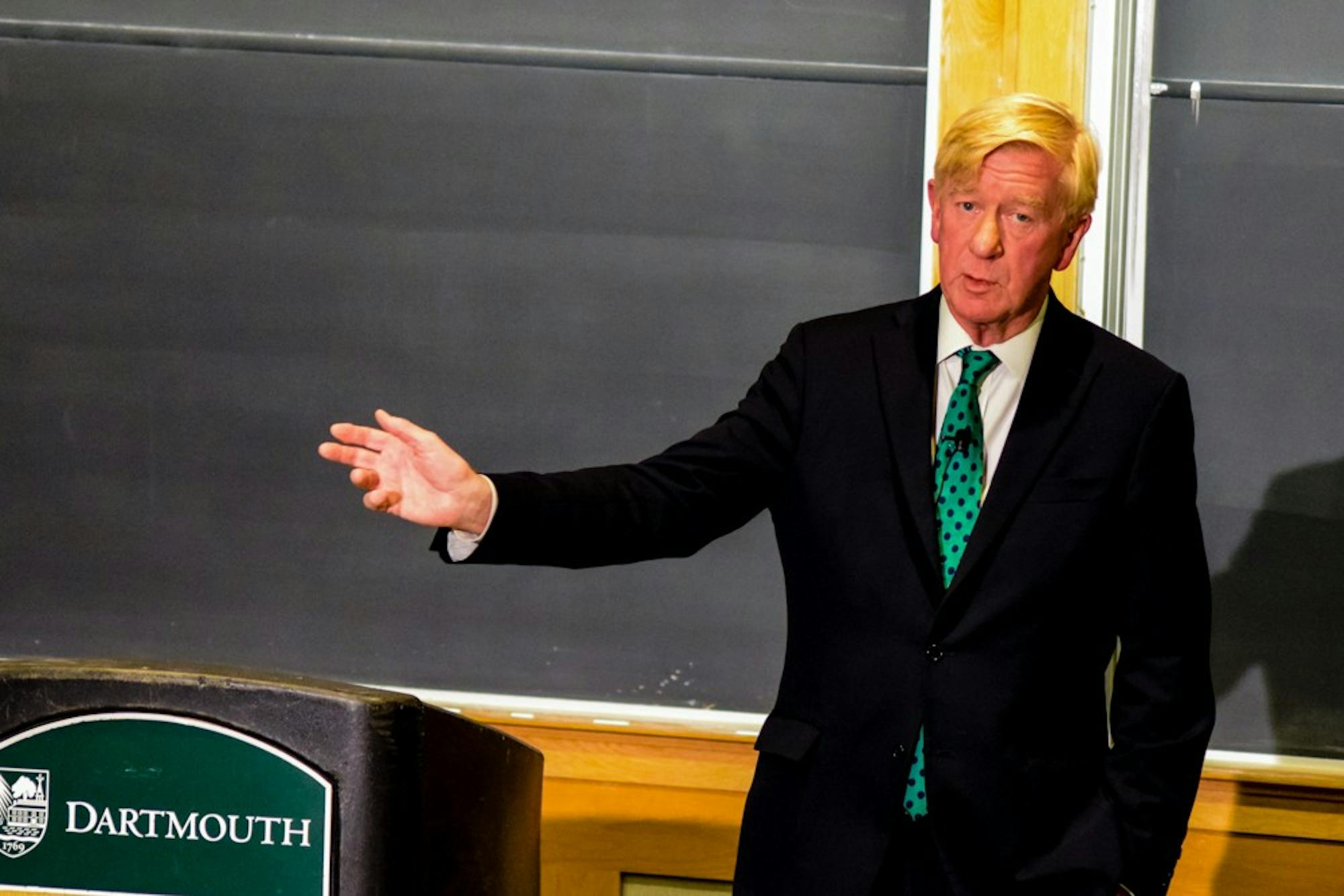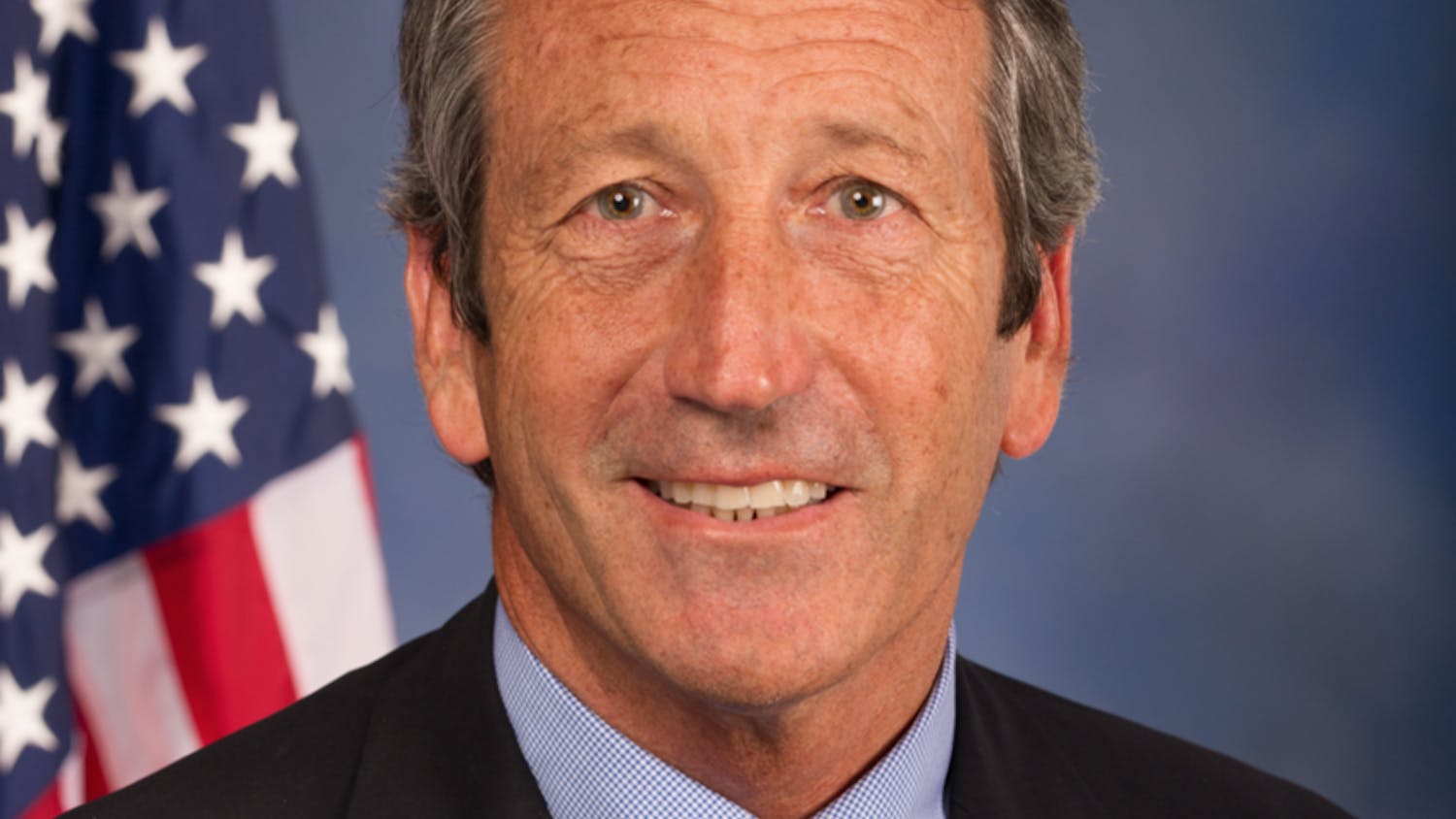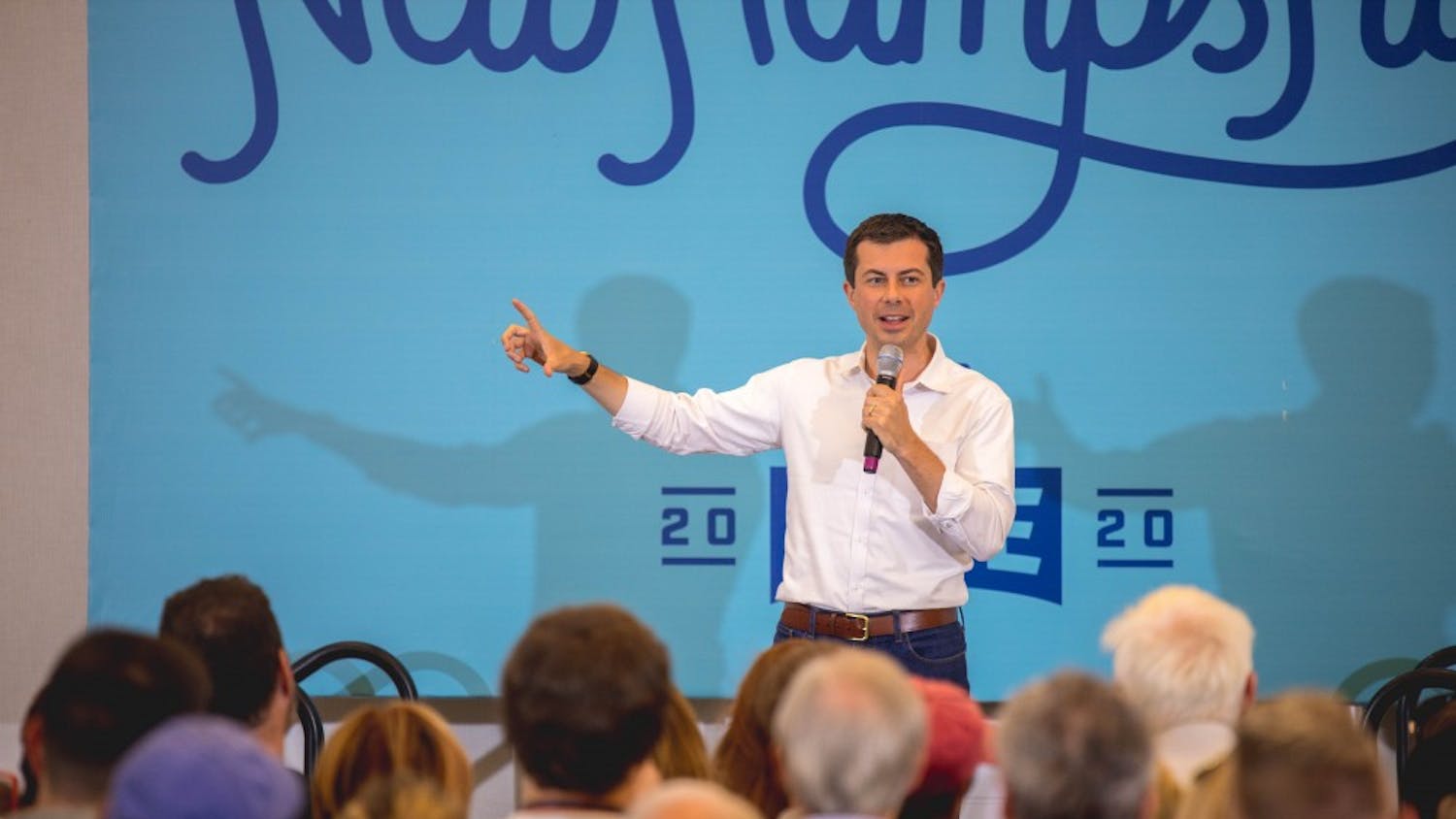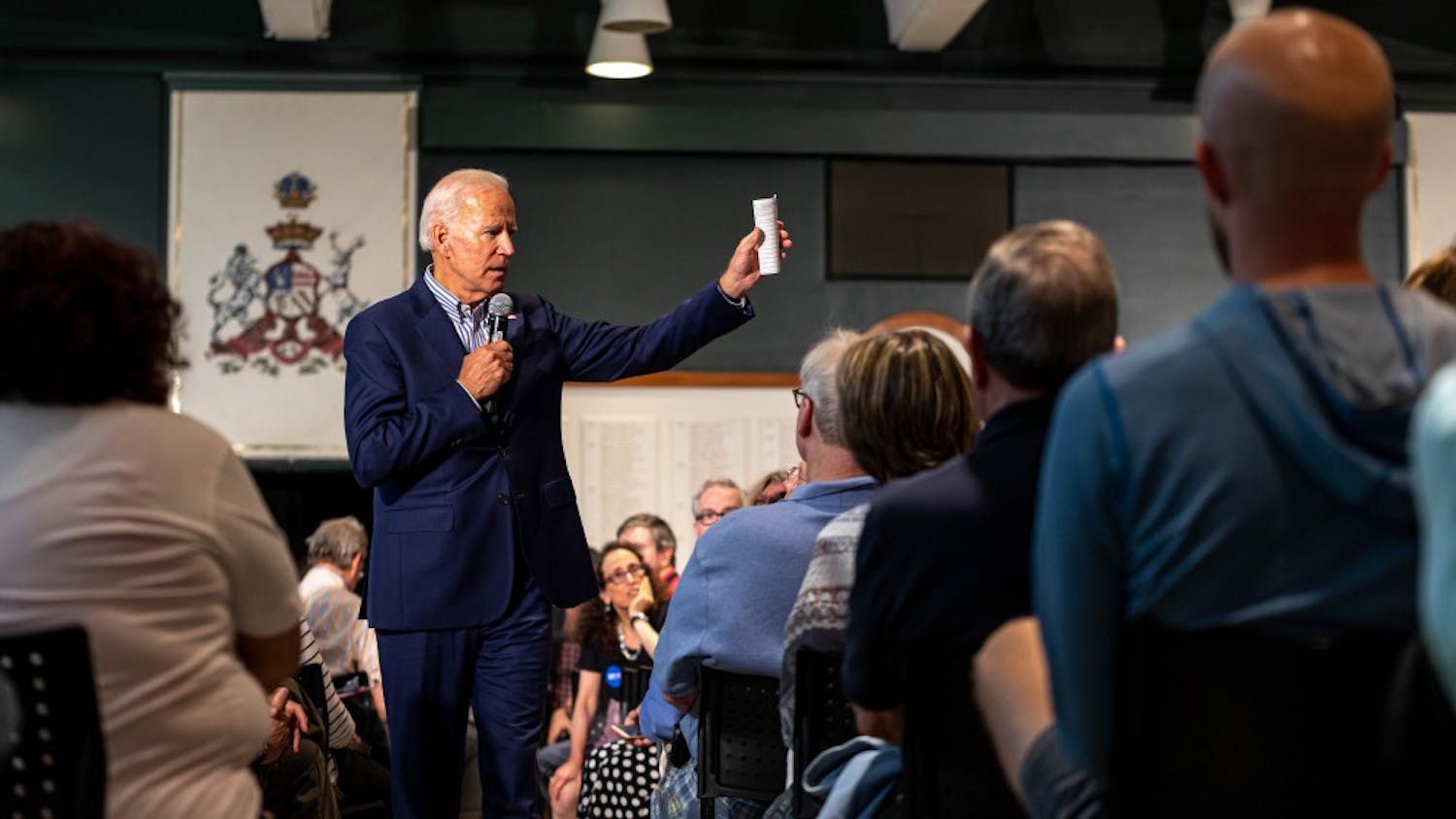Last Thursday, former Massachusetts governor Bill Weld, one of the few Republicans challenging President Trump for the GOP’s 2020 nomination, spoke at a College Republicans event in Moore Hall. Advertised as a policy talk instead of a campaign event, Weld spoke on his views regarding the need for climate change action and answered a series of questions from the audience.
Weld has found himself on both Republican and Libertarian tickets in his political career, running most recently as the vice presidential nominee for the Libertarian Party in 2016 alongside former New Mexico governor Gary Johnson.
Before the policy talk, The Dartmouth sat down with the former governor to discuss his platform, which centers around climate action and deficit cuts from a fiscally conservative standpoint. He also elaborated on how his two-term tenure in Massachusetts taught him valuable lessons about bipartisanship and rigorous fiscal conservatism.
The crowd tonight at Dartmouth is mostly a young one. What do you believe will be the biggest issues that the next generation is going to face, and if elected, what will you do to address those issues?
BW: Well, the one-two punch is climate change and trillion-dollar deficits. Those are both issues in which Gen X-ers and millennials are going to wind up reaping the whirlwind, and it is really unfair as a generational matter if the next president does not tackle those head-on. The deficit is a generational thing. If nothing is done there, your generation can forget about having Social Security. It’s also a national security issue, because with trillion-dollar deficits, you are relying on other countries to buy off our treasury bills, and we can only rely on China for that for so long. It is completely irresponsible. When I was governor of Massachusetts for two terms, I cut the deficit immediately. I cut spending. I cut taxes. I was ranked the most fiscally conservative governor in the United States by The Wall Street Journal and the Cato Institute. That’s something I associate with the Republican party, being economically conservative — historically.
You say “historically.” What has changed?
BW: Nobody in Washington is looking out for the taxpayer. The Democrats want to increase social spending, the Republicans want to increase military spending, and they compromise by raising everything 20 percent, or they don’t compromise at all.
What policies, if elected, would you bring to the table to achieve climate change reform and deficit reform?
BW: Well, with climate change, I would rejoin the Paris Accords and I would put a price on carbon, probably $40 to $50 a ton for carbon when it is introduced to the atmosphere or the economy. Such a price would be implemented upstream. That means for oil and gas companies it would be at the wellbore, and for mining companies it would be in the mineshaft. People would not feel it at the time; it would be all paid before it gets to the consumer. That results in the temperature not increasing by more than 1.5 degrees Celsius by 2050, which is the only thing that the UN framework and the Paris Accord requires. This measure would collect about $200 billion per year and it would be remitted to the taxpayers in payroll tax cuts. You could also repeal other carbon enforcement mechanisms such as the gas and diesel tax. Most proposals have some form of payroll tax cuts, normally targeted toward low-income taxpayers. My plan is tax neutral, while the Democratic plans are all defined by how much they are spending. You have to approach each budget year with a zero-based approach, which means that each appropriation has to start at zero. If a program did a good job last year, it might get an increase. I found in Massachusetts there were a lot of so-called “sacred cows” in the budget that aren’t doing a damn thing. This is because they were the pet projects of some senators. You have to zero those out to find the real savings. I cut dollars in absolute terms year after year as governor — it is how you get ranked as a fiscal conservative.
Many Democratic presidential candidates have offered plans for extensive social benefits, including free health care. As a fiscal conservative, do you disagree with the Democratic candidates’ platforms, and why?
BW: It depends on the issue. I think I am the only guy who put forward a plan to help workers who will get displaced by artificial intelligence. My plan is to make available to them, at no cost, the necessary technical education to qualify for replacement jobs. I ran the numbers on what it would cost, and it would be child’s play, just one third of one percent of a state budget. Having been a governor for two terms, I know in my bones that to govern is to choose. I would choose to have the state pick that up, so it would be free — yes “free!” The Bernie Sanders word. But only for displaced workers, not to everybody. One plan that does not pan out is Medicare for All. That suggests an enormous tax increase. If you look at the details of what Senator Sanders and others are proposing, it’s absolutely comprehensive health care coverage with no deductibles, no co-pays, no nothing. Nobody ever pays a penny for health care, but health care is a big expense. For many, it is the biggest expense. So, how will it be paid for? 100 percent through the income tax. It would be the biggest tax increase in history.
If elected president, what would the health care system look like under your leadership?
BW: I’d build on the Affordable Care Act, not repeal it. We have added 20 million people to the rolls of the insured, and that is a very good thing. But, I would get some of the government directives out of the system. Right now, the government is telling everybody what kind of plan they must have, and I would want that to be more up to individuals and doctors. I am not a big believer in big government; I come from the libertarian side of the Republican Party. I think we should be able to buy prescription drugs in Canada and buy health insurance across state lines. In both those instances, it is the government that is telling us “No, you can’t do that.” It doesn’t make any sense!
What would you tell a young person who fears their children will be worse off than they are now?
BW: I’d tell them if we don’t stop the trillion-dollar deficits, they will be much worse off. And unless we fix climate change, they might not be alive.
You disagree with President Trump on certain key issues, including climate change and his attitude toward the press. Can you share your thoughts on the Trump presidency?
BW: Free press is “the enemy of the people:” that is a would-be dictator talking. I think the President goes in the wrong direction on foreign policy by favoring dictatorships such as Russia, North Korea, the Philippines and the alt-right parties of Europe. At the same time, he goes out of his way to insult our allies, including NATO and many European countries.
If elected, would you protect citizens’ voting rights and voting access, which remains a key issue for college students living in New Hampshire?
BW: Oh yeah. I am in favor of mobile voting, which would allow you to vote on your cell phone. If you look at my Apple cell phone here, it already recognizes fingerprints and it can recognize the iris. I wish it could happen for the next election. You could just take a selfie of yourself when you vote, and it would get emailed to the people at the voting station. Frankly, that’s more secure than if you walk in and say, “My name is John Jones, I live on Mill St., I’m not going to give you any further information and I want to vote.” They don’t know John Jones.
Why are you the candidate that young people, like Dartmouth students, should look to in 2020?
BW: My record shows that I reach across the aisle to work with other parties. When I was hiring judges or people for my cabinet, I never asked if they were Republicans or Democrats. I just tried to find the smartest person. And that strategy would be a long, cool drink of water in Washington D.C. People say, “How can you reach across the aisle when Washington is so divided?” You just do it! That’s what I did with the Democrats in Massachusetts. We met once a week for a summit meeting every Monday, just to go over the issues, and we never had a fight. And they still do that in Boston — all the governors since me have pursued it. They still meet at the same time on Monday afternoons. If you meet once a week with somebody, you are less likely to tell the press that they are a loser or stab them in the back on some policy issue. Additionally, I am a strong environmentalist. I am a fiscal conservative, which is good for young people. I have a lot of international experience, which is good for the country. I am calm and comfortable in my own skin, I never fly off the handle and never get angry. Now that would be handy in Washington!
This interview has been edited and condensed for clarity and length.




